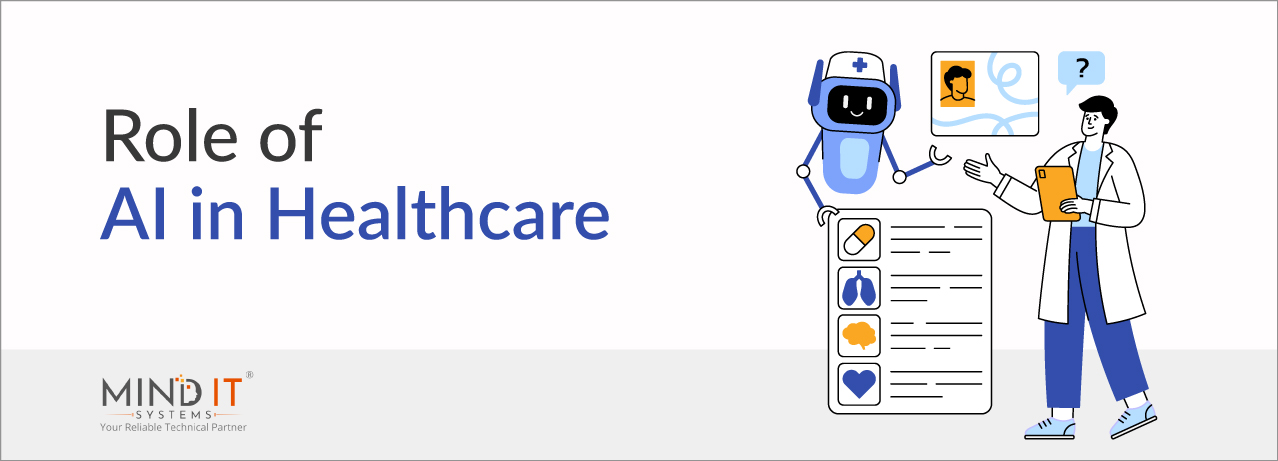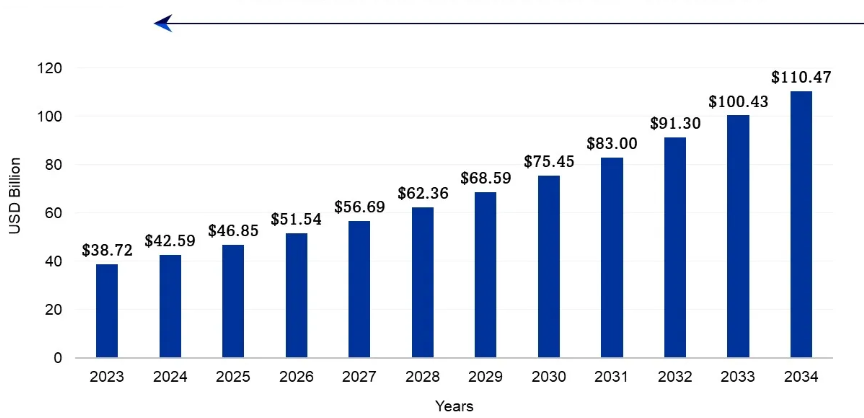
The Role of AI in Healthcare Sector
Introduction
The healthcare sector faces some serious challenges like increasing costs, staff shortages, and an abundance of data. Automation powered by AI in healthcare provides innovative solutions to these complex issues. The use of Artificial Intelligence in the medical field enhances care quality, streamlines operations, and optimizes diagnostics. Join us to explore how AI is changing healthcare.
Role of Automation in the Healthcare Sector
Automation is modernizing healthcare by leveraging advanced technologies like artificial intelligence (AI), machine learning (ML), and data analytics to improve workflows, enhance decision-making, and reduce human intervention. The international healthcare automation market is expected to be worth $42.59 billion in 2024 and is projected to grow to $110.47 billion by 2034, with a steady annual growth rate (CAGR) of 6.2% from 2024 to 2034.
Healthcare Automation Market Size 2023 to 2034

Image Source: Precedence Research
Notable examples are:
- Software applications for scheduling, billing, and reporting, saving countless hours of productivity.
- AI-powered tools that analyze medical images recognize patterns and help diagnose more than 90% of specific areas.
- Robotic systems that automate minimally invasive surgeries, medication administration, and laboratory tasks.
Automation in healthcare is paving the way for more efficient, accessible, and patient-centered healthcare.
Boost your healthcare operations with AI technology. Partner with experts for a seamless digital transformation.
Types of Medical Automation
Medical automation falls into two primary categories:
- Administrative Automation: Automates tasks like billing, scheduling, and record management to improve efficiency and reduce workload.
- Diagnostics and Treatment Automation: AI in healthcare helps to analyze medical data, detect issues, and provide precise, personalized treatment recommendations.
Challenges Addressed by AI in the Healthcare Industry
Beyond efficiency, AI automation in healthcare plays a key role in solving medical care challenges. Let’s look at the benefits of AI in healthcare – how it’s tackling challenges such as rising care costs, limited workforce, and managing complex patient data.
1. AI-Powered Administrative Efficiency in Healthcare
AI is automating key administrative tasks in healthcare, such as appointment scheduling, billing, and patient data management. This allows healthcare providers to focus on delivering better care while AI handles the backend work. It also speeds up insurance claim processing and improves accuracy with less human intervention.
Top Advantages of AI
- Increased Productivity: AI frees time for healthcare workers to focus on patient care.
- Improved Accuracy: Reduces administrative tasks like billing and data management errors.
- Cost Efficiency: Reduces operational expenses by eliminating time-consuming manual processes.
Case Studies
- Scheduling Made Easy: A New York hospital adopted AI to automate patient scheduling, streamlining operations.
- Faster Billing: A London healthcare facility saw a 40% reduction in claim errors after using AI-driven billing systems.
- Real-Time Updates: An extensive U.S. healthcare network uses AI to keep patient records current and accurate, reducing staff workload.
With AI automating routine admin tasks, healthcare facilities are running more smoothly, saving time and improving patient care.
2. AI in Diagnostics & Imaging Revolutionizing Healthcare
Healthcare providers often struggle with chronic conditions and remote patient monitoring. AI-powered systems enhance diagnostic accuracy by quickly analyzing medical data, helping healthcare professionals make more precise decisions.
Key Benefits of Artificial Intelligence
- Speedy Diagnosis: Reduces wait time for test results and treatment.
- Decision Assistance Supports healthcare professionals in diagnosing conditions.
- Early Detection Enables early treatment, reducing the need for invasive procedures.
- Improved Accuracy Detects issues that the human eye may overlook.
Applications in Healthcare
- Early Cancer Detection: AI detects tumors in scans earlier, leading to better survival rates.
- Heart Health: AI examines heart scans to identify abnormalities like arrhythmias.
- Eye Care: Detects retinal conditions, offering early treatment to preserve vision.
AI is changing the diagnostics landscape, improving treatment outcomes, and reducing the burden on healthcare providers.
3. AI Advancements in Drug Discovery
AI quickly identifies potential drug candidates by analyzing complex data, reducing the time and cost of bringing drugs to market.
Key Advantages of AI in Drug Discovery
- Speed AI shortens early Discovery, making drug candidates available faster for trials.
- Cost Efficiency AI minimizes the financial risk by predicting which drug candidates are most likely to succeed.
- Innovative Drug Designs AI uses data-driven insights to improve drug effectiveness and safety.
AI-Driven Drug Discovery Breakthroughs
- Alzheimer’s Treatment: AI is helping discover new drug candidates to treat Alzheimer’s and other difficult-to-treat diseases.
- COVID-19 Drugs: AI has been instrumental in finding drugs to repurpose for COVID-19 treatment.
- Predictive Modeling: AI accurately predicts which drug candidates will most likely succeed in clinical trials.
AI is revolutionizing the drug discovery process, cutting costs, increasing speed, and leading to groundbreaking treatments.
4. AI-Driven Personalized Care
AI uses patient data—like genetics and lifestyle—to craft personalized treatment plans. Machine learning identifies what works best for each individual, transforming the one-size-fits-all approach into precision medicine.
How AI Enhances Patient Care?
- Continuous Health Monitoring: Tracks patient progress to predict and manage conditions like cancer and heart disease.
- Early Detection: Flags risks for diseases early, enabling preventive actions.
- Bespoke Treatment Plans: AI personalizes therapies for maximum effectiveness.
Applications
- Diabetes care systems refine insulin doses based on real-time data.
- Cancer therapies are tailored using genetic insights.
- Heart health monitoring tools predict risks and guide lifestyle changes.
With AI, healthcare becomes more accurate, proactive, and patient-centered.
5. Proactive Health with AI Wearables
AI-enabled wearables, such as fitness trackers, are reshaping healthcare. They monitor vital health data and provide instant analysis, empowering patients to take charge of their well-being.
This technology enables early intervention, improving outcomes for chronic conditions and reducing unnecessary hospitalizations.
Benefits
- Early Detection: Identifies health issues before they become serious.
- Proactive Alerts: Notifies users of irregular health patterns.
- Chronic Care: Supports long-term condition management effectively.
Why it Works?
- Improves health outcomes through personalized insights.
- Reduces the need for frequent hospital visits.
- Keeps patients connected with their care teams remotely.
6. The Power of AI and Robotics in Surgery
The fusion of robotics and Artificial Intelligence is changing how surgeries are performed. These innovations give surgeons advanced tools for real-time decisions, ensuring safer procedures and better results.
Why it Matters?
- Minimally Invasive Options: Smaller incisions mean less pain and faster recovery for patients.
- Superior Precision: Robots with AI assistance improve accuracy during delicate procedures.
- Fewer Complications: Reduced risk of errors leads to safer surgeries.
Examples in Action
- Prostate Surgeries: Robots deliver remarkable precision, speeding up recovery and minimizing side effects.
- Heart Surgery: AI-assisted robotic systems excel in complex valve repair operations.
- Laparoscopy: AI integration leads to shorter hospital stays and fewer complications.
The future of surgery is here, powered by AI and robotics, improving lives one procedure at a time.
7. Smarter Telemedicine with AI
Artificial Intelligence is transforming telemedicine, creating a faster, more efficient healthcare system. From symptom tracking to virtual consultations, AI ensures patients get timely care when needed.
AI Tools in Telemedicine
- Symptom Checkers Instantly assess symptoms and recommend next steps.
- Wearables Real-time data analysis alerts doctors to changes in patient health.
- Automated Care AI sends reminders and health tips, keeping patients on track with treatment plans.
The Future Is Bright
- 24/7 Chatbots: AI chatbots provide constant support and answer common questions.
- Remote Care Access: Artificial Intelligence makes virtual consultations effective for patients in any location.
- Human-Like Interaction: Chatbots are becoming more engaging, improving the patient experience.
AI-driven telemedicine is the future, ensuring accessible, efficient, and quality healthcare for everyone.
Ethics and Rules for AI in Healthcare
Artificial Intelligence (AI) in healthcare needs to balance innovation with ethics and regulation to ensure safety and fairness.
Privacy First
Patient data is sensitive. Strong protections and clear consent processes are vital for trust.
Regulatory Needs
- Keeping Up: AI is evolving faster than rules. Updates are essential.
- Joint Efforts: Developers and regulators must work together to ensure safety.
Making AI Fair
- No Bias Allowed: AI systems must deliver fair outcomes for all patients.
- Clear Decisions: Transparency ensures doctors can trust AI recommendations.
Collaborative Approach
- Stakeholder Involvement: Bringing together patients, professionals, and ethicists creates better outcomes.
- Regular Checks: Education and audits keep AI compliant and effective.
Ethical AI can make healthcare smarter, safer, and more inclusive.
The Promising Prospect of AI in Healthcare
Automation in healthcare continues to evolve, bringing immense impacts. Here’s a glimpse of what’s to come:
- Faster Diagnoses: AI will help identify diseases early, improving treatment plans and patient recovery.
- Informed Decisions: AI tools will provide healthcare providers with valuable insights, ensuring optimal care.
- Remote Healthcare: AI-powered telemedicine will improve healthcare access for underserved communities.
- On-demand Support: AI-driven chatbots and virtual assistants will streamline patient care, offering support anytime, anywhere.
- Proactive Health: With predictive analytics, AI will identify high-risk patients and help prevent future health issues.
AI is not just a tool; it’s a revolution that will transform healthcare as we know it.
Ending Words
As artificial intelligence (AI) continues to shape the future of healthcare, partnering with the right technology expert can unlock its full potential. The benefits of AI in healthcare are vast, including transforming patient care, optimizing workflows, and creating a more sustainable healthcare landscape.
Achieve new heights in patient care and operational efficiency with AI-powered healthcare solutions. Take the first step toward innovation.
Share this post
About the Author

Sujoy Roy
(Head – Digital Marketing)
From my teenage time, I had a quench to solve problems and loved leadership. Starting my career in relation management, ignited my passion for managing people. While managing I realized technology needs to be incorporated to keep pace with the changing world & do my work efficiently.

